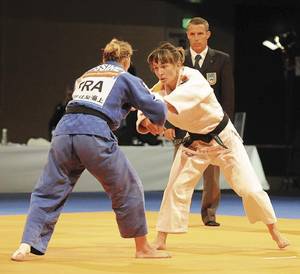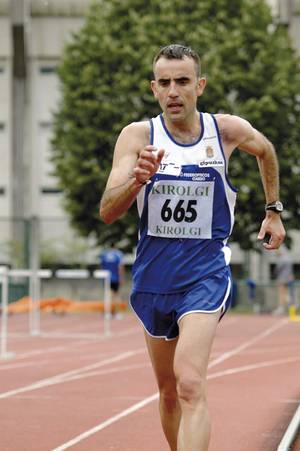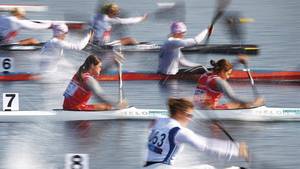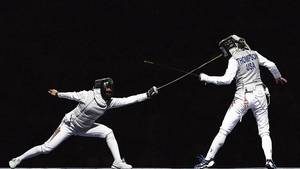London is a biological passport for 2012

Portuguese athlete Helder Ornelas will not attend the London Olympic Games. In the games of Sydney participated in the race of 5.000 meters and in the games of Beijing in the marathon. But it will not participate in any of the games in London; the Portuguese Federation has left four years without ability to compete because it has given positive in antidoping analyses. In fact, they have not detected prohibited substances in the body and have not shown that they have used another procedure or authorized. But experts believe it has doped in some way.
The complaint comes from the controls of the biological passport. The analyses carried out between December 2009 and November 2010 recorded the usual blood parameters of Orneles. In the blood tests of May 2011 these parameters were modified, irregularities existed and the International Association of Athletics Federations (IAAF) consulted three experts on the case of Ornelas. The three agreed: the most logical explanation for irregularities is doping. The IAAF opened a record to the athlete and recommended the Portuguese Federation to sanction him for four years. And the federation, following the recommendation, punished the athlete.
--> Analysis by sports doctor Iñaki Arratibel on the fight against doping.
It was the first case, but there may be many more cases. For example, an athlete may have lower or higher than usual parameters in games and be sanctioned. This was highlighted by King's College researcher David Cowan, head of the game analysis laboratory.
The London Games will, by far, be the Olympic Games that will have the most demanding controls so far. They will begin on July 27 and last 17 days. During this period, a team of 150 scientists will perform the same number of tests they usually perform in one year: at least 6,250 urine tests and 20% blood of athletes. There, of course, they will look for indications of prohibited substances in the blood and urine of athletes and explore the evolution of the biological passport.
Blood, hormones and steroids
The idea is to explore the evolution of an athlete by analyzing three profiles. On the one hand they include the hematological analysis of the athlete, on the other the steroid and finally the endocrinological. The first will analyze the number and status of red blood cells and the other two will analyze the presence of hormones. In all cases, they are products generated by the body, so it is difficult to discern whether their high levels are a consequence of an external injection. Hence the idea of the biological passport that these substances do not present significant variations in the body if they are not due to an irregularity, so the evolution of these profiles can be revised in time. When this occurs, more studies can be done to determine whether the cause of irregularity is doping.
However, they still cannot control the three profiles, since they have not implemented the methodology for this, nor will the London games analyse the profiles of steroids or other hormones. Therefore, for the moment, they only measure the hematological profile in the biological passport.
Blood tests have been prioritized by the prestigious EPO and blood transfusions. In fact, control of both has been one of the main reasons to invent the biological passport. EPO, erythropoietin, is a molecule that launches the formation of red blood cells, a hormone. EPO injection increases the production of red blood cells. And another way to achieve the same effect is blood transfusion with many red blood cells before the competition. The international antidoping association WADA considers these two activities as doping, but they are difficult to detect.

For the blood profile of the biological passport are measured hematocrit, hemoglobin, percentage of reticulocytes and five other indicators, all related to oxygen transport. The controls are numerous. "In addition to the analyses carried out by the Federation, the controls are carried out by WADA and IAAF," says Mikel Odriozola, an athlete who will participate in the 5000 edition of the London games. "Most analyses take place in competitions, but they are often unexpected. Normally in competitions there is usually blood tests. Outside the competition, they are usually of urine and blood; the Spanish Federation only makes of urine and blood normally do those of WADA".
The registration of the odriozola, in addition, is formed by old data. "I'm always going through controls. In 1996 I started at the high-performance centre of San Cugat in Barcelona and since then I have two or three controls a year." However, receiving so many data does not guarantee the perfect control of athletes.
Changes without doping
On the one hand, it is not certain that the biological passport system detects microtransfusions. On the other hand, fluctuations in blood parameters, for example, are not necessarily indicators of doping. Travel, medical treatments, accidents, food changes, etc. They can alter the parameters of the athlete, so the control of the biological passport obliges the athletes to reveal their life, whether or not in competition.

"You have to say every day where you are 24 hours," explains Odriozola. "We filled out some chips every 3 months. You must write which championships you will perform, where you will train, etc. And if in those three months I change the site suddenly, for example a week, I have to warn that I am there."
However, this strict control of personal life is not exclusive to the biological passport. In the London games the passport will only apply in some sports - athletics, rowing, triathlon, cycling and swimming -; in judo, for example, it will not be used and, however, follow-up to the Jews is rigorous.
Oiana Blanco is a good example of judoka that will come to the London games. "I am included in the ADO plan [ADO is the Spanish Olympic Sport Association]. I have to write where I will be at every moment. The registration must be sent quarterly indicating its location in morning and afternoon." However, the number of analyses is lower. "To me they only do urine analysis. It is usually two or three times a year, sometimes unexpected."
The future of the passport in doubt
Sports federations and all countries have not accepted the biological passport. The idea is only a few years old, it comes from the world of cycling. It was proposed by the International Association of Cyclists UCI in 2007 and began to apply in early 2008. In these few years it has spread to other sports and it seems that the tendency is to spread to all sports. For example, the French Parliament has passed a law for its application to all sports as of July 2013.
But he also has strict criticism. "Does everything serve to fight doping?" question Guillermo Amilibia, lawyer specialized in sports, in the specialized web Iusport. It must be taken into account that the passport system does not guarantee that the sanctioned athlete has been doped. It does not respect the presumption of innocence. In addition, rigorous monitoring of the athlete is expensive, too expensive for some countries.
On 27 July the London Olympic Games begin, the most important event that has so far had the biological passport. What happens there can be considered as evidence. Later we will have to see who and what biological passport accepts.
Buletina
Bidali zure helbide elektronikoa eta jaso asteroko buletina zure sarrera-ontzian













